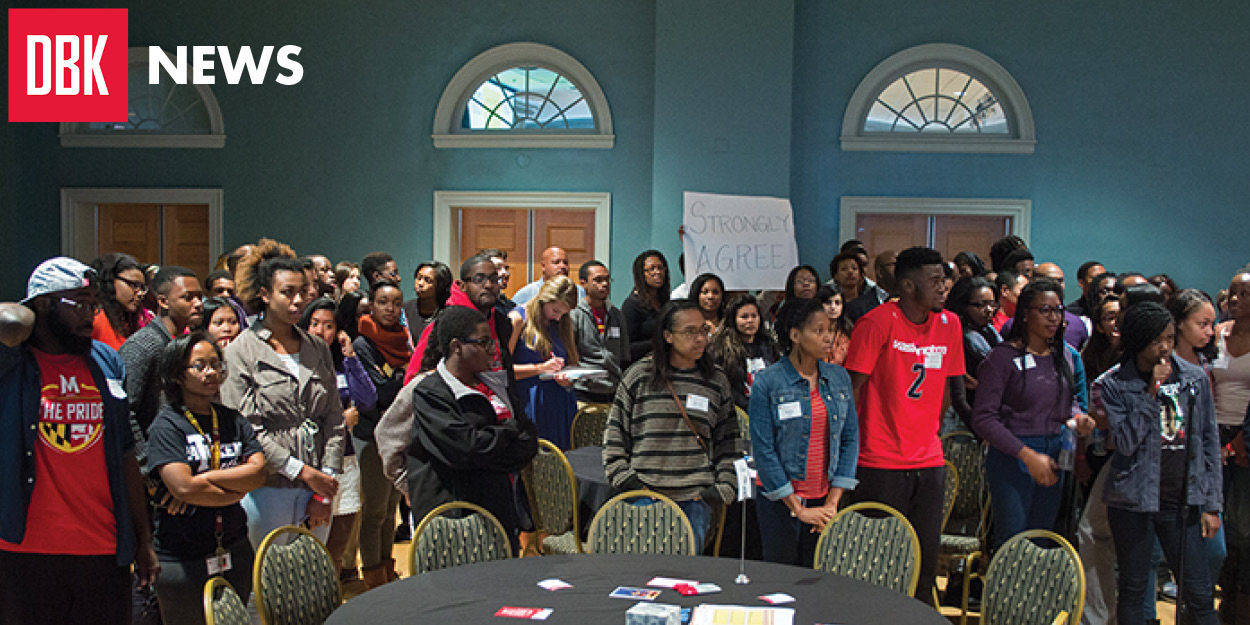
Domonic Rollins had audience members get up and relocate around the Colony Ballroom event to show whether they “Agreed,” “Disagreed,” “Strongly Agreed,” or “Strongly Disagreed” with statements he made.
“You’re really pretty for a dark-skinned girl.”
This is an example of a racial microaggression, and it’s one of several this university’s chief diversity officer, Kumea Shorter-Gooden, gave at a round table discussion on the issue in Stamp Student Union’s Colony Ballroom last night. She said these statements of subtle racism can have much a much more negative impact than their name would suggest.
“Microaggressions are everyday, commonplace comments, slights, invalidating remarks that can marginalize people. They aren’t big,” Shorter-Gooden said. “They’re not overwhelming, but the cumulative effect can lead students to feel like ‘This isn’t my place; I don’t really belong here.’”
Some 200 students, faculty and staff attended the discussion, which kicked off the Office of Diversity and Inclusion’s second annual “Rise Above Isms” week. The focus fell on one of the many ‘isms’ the week will address: racism.
Guests sat at tables of 10 to engage in small group discussions, each facilitated by someone from the Office of Diversity & Inclusion or one of the other offices that co-sponsor the week, such as the LGBT Equity Center and the Nyumburu Cultural Center.
Attendees filled out worksheets about microaggressions they’d experienced, how they felt about those experiences, and how they responded. Students then shared their experiences and brainstormed ways to respond, both individually and collectively.
Freshman architecture major Allexxus Farley-Thomas said that in her middle school, which was predominantly black, her peers always told her that she spoke as though she was white.
“I felt sort of like less of a black person,” she said. “It’s sort of ignorance because it leads to that idea that black people may not have that education.”
Chris Lane, a senior marketing and theatre major, made up an acronym about how past microaggressions have made him feel. The acronym is PAUSE, which stands for pain, anger, understanding, sorrow and emptiness.
“Moving forward, I’ll be more aware of when I feel those different things, and then I’ll be more equipped to actually speak up and say something,” he said.
Guests also participated in a large group activity facilitated by doctoral candidate Domonic Rollins, who works in the Office of Diversity & Inclusion.
Rollins read statements and attendees moved to a corner of the room based on how much they agreed to the statements.
Choices ranged from strongly disagree to strongly agree. There was no neutral option.
Responses varied. When Rollins’ statement was “Anyone can be racist,” students could be seen in all four corners of the room, although most strongly agreed.
When hearing the statement that their “peers have an understanding of diversity issues on our campus,” almost all students disagreed or strongly disagreed. Only one student strongly agreed.
“That was eye-opening. If you think about how the group responded to those questions, it helps to justify why we’re here today,” Grace Benigno said of the large group activity. Benigno, the coordinator of student services for the Incentive Awards Program, co-planned this event with Tony Randall, program coordinator for the Student Success Project, which aims to increase retention and graduation rates for black students.
Throughout the night, students used the hashtag #ITooAmMaryland to tweet and Instagram their pictures and thoughts from the event.
“I wanted them (the students) to know that the campus community or at least people in the campus community care about and know about their experiences,” she said.
Because racial microaggressions seem small, Shorter-Gooden said many victims have a harder time speaking up in response.
Prior to the discussion, senior microbiology major Tochi Ukwu was one of them.
“From this dialogue, I have gotten that it’s OK to speak up and it’s OK to share my feelings if I’m hurt by something that someone says,” she said.
Randall, who said the closing remarks, added that he hopes that all attendees had a similar experience.
“Today marks a new beginning at the University of Maryland for each of you. You now know that there’s a community that cares,” he said. “Our hope is that you take this energy and use it to change those around you.”



